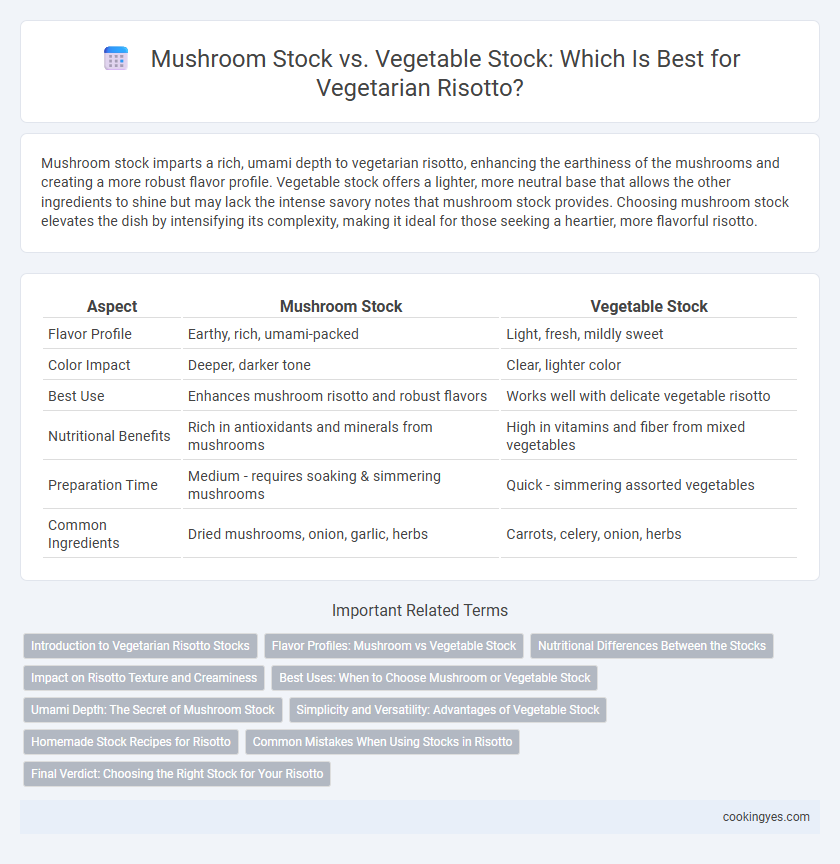Mushroom stock imparts a rich, umami depth to vegetarian risotto, enhancing the earthiness of the mushrooms and creating a more robust flavor profile. Vegetable stock offers a lighter, more neutral base that allows the other ingredients to shine but may lack the intense savory notes that mushroom stock provides. Choosing mushroom stock elevates the dish by intensifying its complexity, making it ideal for those seeking a heartier, more flavorful risotto.
Table of Comparison
| Aspect | Mushroom Stock | Vegetable Stock |
|---|---|---|
| Flavor Profile | Earthy, rich, umami-packed | Light, fresh, mildly sweet |
| Color Impact | Deeper, darker tone | Clear, lighter color |
| Best Use | Enhances mushroom risotto and robust flavors | Works well with delicate vegetable risotto |
| Nutritional Benefits | Rich in antioxidants and minerals from mushrooms | High in vitamins and fiber from mixed vegetables |
| Preparation Time | Medium - requires soaking & simmering mushrooms | Quick - simmering assorted vegetables |
| Common Ingredients | Dried mushrooms, onion, garlic, herbs | Carrots, celery, onion, herbs |
Introduction to Vegetarian Risotto Stocks
Mushroom stock enhances vegetarian risotto with rich umami flavors and a deep, earthy aroma that elevate the dish's complexity. Vegetable stock offers a lighter, more neutral base, allowing other ingredients like fresh herbs and seasonal vegetables to shine. Choosing between mushroom and vegetable stock depends on the desired flavor intensity and overall character of the risotto.
Flavor Profiles: Mushroom vs Vegetable Stock
Mushroom stock imparts a rich, umami depth with earthy and savory notes that enhance the risotto's complexity, creating a more robust flavor profile. Vegetable stock offers a lighter, fresher taste with subtle sweet and herbal undertones, maintaining a delicate balance ideal for highlighting other ingredients. Choosing mushroom stock intensifies the risotto's savoriness, while vegetable stock provides a cleaner, more neutral base that complements a wider variety of vegetables.
Nutritional Differences Between the Stocks
Mushroom stock contains higher levels of antioxidants such as ergothioneine and beta-glucans, which support immune function and reduce inflammation. Vegetable stock, while lower in these specific compounds, offers a broader range of vitamins including vitamin C, potassium, and folate derived from diverse vegetables. Choosing mushroom stock enhances umami flavor alongside added nutritional benefits, whereas vegetable stock provides a lighter base rich in essential micronutrients for vegetarian risotto.
Impact on Risotto Texture and Creaminess
Mushroom stock enhances risotto texture by imparting a rich, umami depth that promotes a silkier, creamier consistency. Vegetable stock, while lighter and more neutral, may result in a less velvety mouthfeel, relying more on the starch release from Arborio rice for creaminess. The choice of stock directly influences the risotto's overall flavor complexity and luxurious texture, with mushroom stock providing a more robust and cohesive creaminess.
Best Uses: When to Choose Mushroom or Vegetable Stock
Mushroom stock enhances vegetarian risotto with a deep, umami flavor that complements earthy ingredients like wild mushrooms or truffle oil, making it ideal for autumn or gourmet recipes. Vegetable stock provides a lighter, more versatile base suitable for delicate risotto variants featuring spring vegetables such as asparagus or peas, allowing other flavors to shine. Choose mushroom stock when a rich, savory depth is desired, and vegetable stock for subtler, fresher flavor profiles in your risotto.
Umami Depth: The Secret of Mushroom Stock
Mushroom stock provides a richer umami depth compared to standard vegetable stock, enhancing the overall flavor complexity of vegetarian risotto. The natural glutamates in mushrooms intensify the savory profile, creating a more robust and satisfying taste experience. Using mushroom stock elevates the dish by delivering a deep, earthy richness that complements the creamy texture of risotto perfectly.
Simplicity and Versatility: Advantages of Vegetable Stock
Vegetable stock offers simplicity and versatility for vegetarian risotto, as it provides a light, neutral base that complements a wide range of ingredients without overpowering the dish. Unlike mushroom stock, which imparts a strong, earthy flavor, vegetable stock enhances the natural taste of seasonal vegetables and fresh herbs. Its adaptable flavor profile makes it ideal for chefs seeking a balanced, customizable foundation in risotto recipes.
Homemade Stock Recipes for Risotto
Homemade mushroom stock enriches vegetarian risotto with deep, earthy flavors that enhance the dish's umami profile, making it a preferred base over generic vegetable stock. To prepare mushroom stock, simmer a blend of dried porcini mushrooms, fresh cremini, garlic, onions, thyme, and bay leaves for 45 minutes, extracting intense, robust flavors vital for risotto. Vegetable stock, made from simmering carrots, celery, onions, and herbs, offers a lighter, more neutral foundation, but lacks the richness and complexity that mushroom stock imparts to the creamy texture and taste of risotto.
Common Mistakes When Using Stocks in Risotto
Using mushroom stock in risotto often results in an overpowering umami flavor that can mask the subtle creaminess of the rice, while vegetable stock can sometimes lack the depth needed to elevate the dish. Common mistakes include using pre-made stocks that contain excessive salt or artificial flavors, which disrupt the balance and texture of the risotto. To avoid these issues, chefs should opt for freshly prepared stocks with controlled seasoning and adjust the amount added gradually to maintain harmony in flavor and consistency.
Final Verdict: Choosing the Right Stock for Your Risotto
Mushroom stock delivers a rich, earthy umami flavor that enhances the depth of vegetarian risotto, creating a robust and savory profile. Vegetable stock offers a lighter, more neutral base that allows the individual ingredients like fresh vegetables and herbs to shine without overpowering the dish. For a hearty, flavor-intense risotto, mushroom stock is ideal, while vegetable stock suits those seeking a subtle, delicate taste.
Mushroom stock vs Vegetable stock for vegetarian risotto Infographic

 cookingyes.com
cookingyes.com